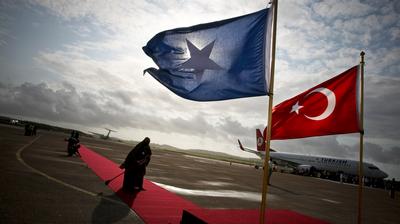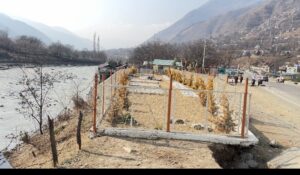Turkey’s Rise as a Compassionate Global Power in Diplomacy and Humanitarian Aid

SOMALIA, Mogadishu: In a handout photograph released by the African Union-United Nations Information Support Team 19 August, a Somali woman sweeps a red carpet at Aden Abdulle International Airport as the flags of Somalia and Turkey flutter in the wind ahead of the arrival of the Turkish Prime Minister Recep Tayyip Erdogan on an official visit to Somalia. AU-UN IST PHOTO / STUART PRICE.
By| Farooq Ah Lone
Foreign policy is driven by a nation’s desire to protect its national interests while enhancing its global influence and power. Diplomacy is the primary tool used by countries to engage in trade, development, tourism, and problem-solving, ultimately building alliances and reducing hostilities. Turkey, with its strategic diplomacy, has focused on expanding its influence and protecting its territorial integrity, while also positioning itself as a compassionate global power.
In recent years, Turkey has increasingly adopted a humanitarian approach to its foreign policy, especially when responding to global crises caused by conflict, climate change, and economic instability. From providing aid to those suffering from natural disasters to mediating in international conflicts, Turkey has been at the forefront of humanitarian diplomacy.
A key example of Turkey’s humanitarian commitment is its intervention in Syria. Turkey’s support for pro-democracy forces and its military action were largely driven by the need to protect the oppressed Sunni population from the Assad regime. In addition, Turkey has become the world’s largest host for Syrian refugees, sheltering approximately 3 million displaced persons.
Another prominent instance of Turkey’s humanitarian involvement was the 2010 “Turkey-Gaza Flotilla,” where a group of ships, including the Mavi Marmara, attempted to break Israel’s blockade on Gaza. The mission, intended to deliver critical aid, ended in tragedy when Israeli forces attacked the Mavi Marmara, killing nine Turkish activists. The attack led to a diplomatic rift between Turkey and Israel, though it underscored Turkey’s commitment to providing aid in even the most challenging circumstances.
Turkey’s dedication to humanitarian causes has not been limited to conflict zones. During the COVID-19 pandemic, Turkey produced and delivered vaccines to countries in need, including both developing and developed nations. Turkey has also provided substantial aid during natural disasters, including the recent floods in Pakistan and Bangladesh, as well as the ongoing crisis in Gaza.
This humanitarian focus has earned Turkey significant recognition. It is now seen as a leading donor in the global humanitarian system, further solidified by the hosting of the first World Humanitarian Summit in Istanbul in 2016. Turkish President Recep Tayyip Erdoğan emphasized at the summit the importance of global solidarity, urging participants to commit to responsibilities toward those suffering worldwide.
Alongside its humanitarian actions, Turkey plays a key role as a mediator in international conflicts. It brokered the grain deal between Russia and Ukraine and facilitated a prisoner exchange between the two countries, earning praise for its ability to engage with both Russia and the West. After the U.S. withdrawal from Afghanistan, Turkey was offered the role of security guarantor at Kabul Airport, leveraging its military strength and diplomatic credibility in the Muslim world.
Turkey’s leadership on the Israel-Palestinian issue also stands out. As tensions escalate, Turkey has remained a strong supporter of Palestinian causes, often hosting key figures from Hamas and the Palestinian Authority. Analysts suggest that with the closure of Hamas’s political office in Qatar, Turkey may become the group’s new base, given its safety and diplomatic clout.
Turkey is emerging as a “compassionate power” in global politics, offering a much-needed counterbalance to rising aggression and hostility in international relations. Through its humanitarian aid, diplomatic mediation, and commitment to peace, Turkey is positioning itself as a key player in shaping a more compassionate global order.
Farooq Ah Lone writes on international relations , in this article special focus on Turkey’s foreign policy. He can be reached at lonefarooqahmad80@gmail.com.




